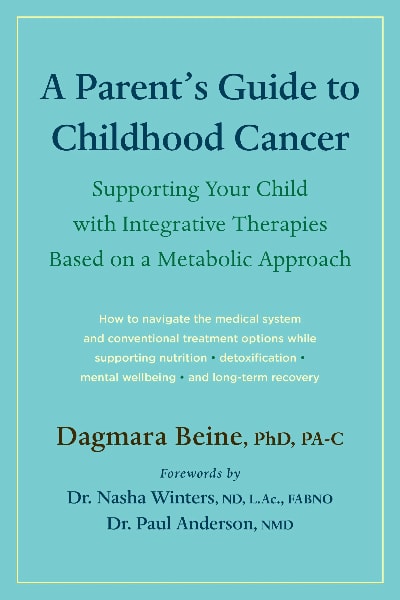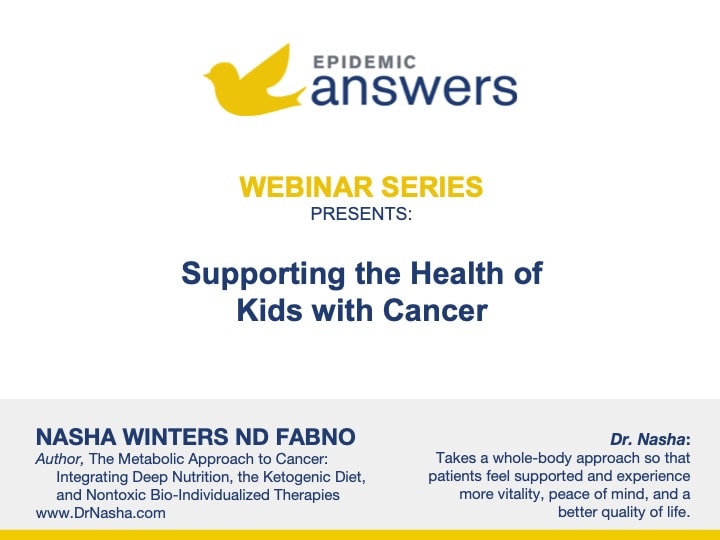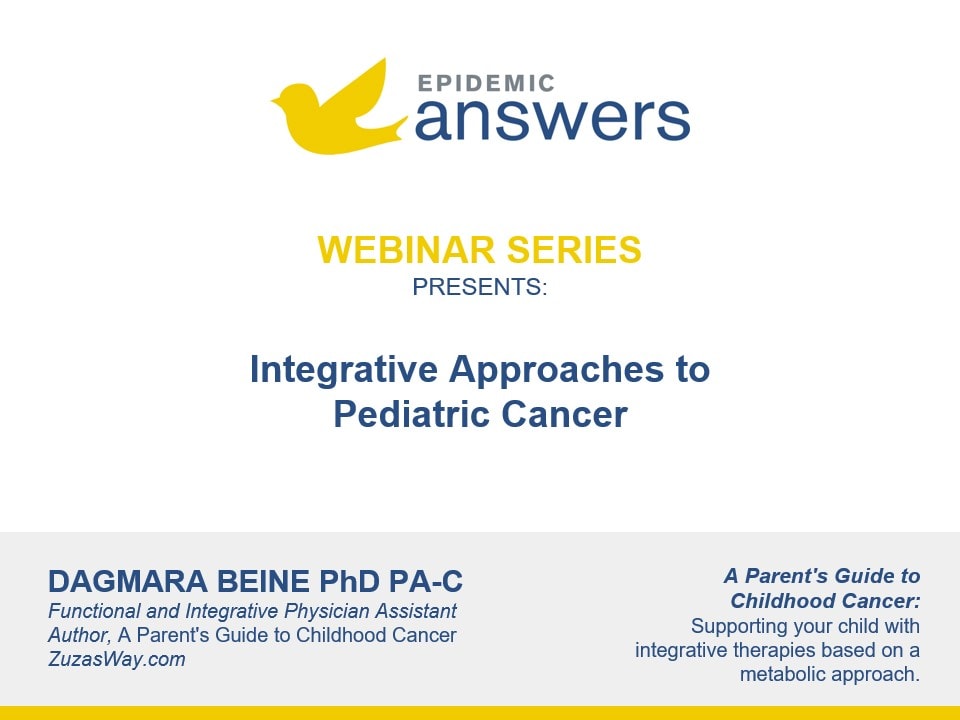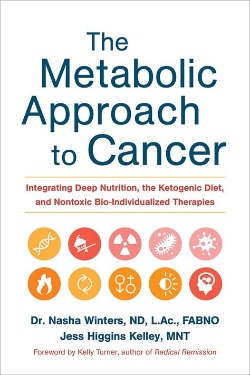Dr. Beine’s Personal Story
Dr. Beine was driven by her daughter Zuza’s diagnosis of acute myeloid leukemia (AML) – a less common but more dangerous form of leukemia – at the age of three. Dr. Beine was originally trained as a physician assistant in emergency medicine but grew to understand the value of integrative therapies and complementary care in her daughter’s cancer treatment. Zuza is now 12 and has achieved five-year remission once and relapsed three times.
Standard of Care Must Be Followed in Childhood Cancer Cases
The stakes are much higher when it comes to childhood cancer because the one-size-fits-all standard of care (surgery, radiation and chemotherapy) must be used. A parent cannot decide that their child with cancer will go forego these standard-of-care treatments because doing so would likely lead to the child becoming a ward of the state in what is known as “medical kidnapping”.
How and Why to Assemble an Integrative Oncology Team
Parents can assemble a team of both conventional and integrative oncology experts, so it’s a good idea to do a lot of research about potential integrative team members as well as what resources and laws are applicable in your home state. Indeed, some parents have chosen to move to different states just to have access to more knowledgeable experts, facilities and resources. Throughout the book, Dr. Beine encourages parents to be the “general contractor” and not to abdicate authority to experts.
For parents whose children have a cancer diagnosis, this book is essential reading before beginning the maze of options and experts. In the beginning of the book, Dr. Beine recommends taking a deep breath – and we agree – because making important decisions in a state of fear and anxiety does not allow you to tap into the parent’s intuition you’ll need for this arduous journey. Being level-headed and less anxious will help parents research treatment options, gather second opinions and make better-informed decisions. Misdiagnoses in pediatric cancer are not uncommon, so it’s a good idea to get second opinions.
In This Book
Traditional cancer treatment is harsh, and it’s even harsher on a child who is still developing. It’s an open secret that common cancer treatments often cause secondary cancers, so detoxification of these toxic treatments, which Dr. Beine addresses in the book, is paramount.
In this book, Dr. Beine discusses, through the lenses of the metabolic theory of cancer (“sugar feeds cancer”) developed by Otto Warburg as well as the mitochondrial dysfunction (“terrain”) theory brought forth by Thomas Seyfried and furthered by Nasha Winters:
- How to find an oncologist that will work with you and is open to working with an integrative or naturopathic oncologist and nutritionist such as those trained at the Metabolic Terrain Institute of Health
- How to assemble an integrative team
- The importance of deep nutrition, circadian rhythm, sleep, movement, stress reduction and going outside
- Why cleaning up the diet is critical
- Why basic supplements such as magnesium, zinc, vitamin D3 and omega-3 fatty acids can help
- Which baseline markers (such as those for gut health, inflammation, metabolic state and food sensitivities) are important to test for before treatment begins and periodically after
- How to interpret results of recommended common blood tests
- How, if and when to use mistletoe, cannabinoids, Boswellia, fermented wheat germ extract, Helleborus, low-dose naltrexone, vitamin C, melatonin, NAC, liposomal glutathione, glutamine, medicinal mushrooms, quercetin, turmeric, dichloracetate, poly MVA and other supplements. Please note that a supplement’s listing here does not mean that it should be used in all cases. In fact, in some cases, their use may be contraindicated. As always, work with your child’s medical team to determine what is best for them.
- How to heal the microbiome after the destruction of it by chemotherapy
- The use of genomic tests (such as for the MTHFR genetic mutation) to best determine personalized treatment options
- How to manage and reduce side effects of conventional cancer treatment
- Why the ketogenic diet is so helpful and how to implement it
- Why blood-sugar control is crucial
- How a bioindividual healing plan for nutrition and drug response can help
- Which everyday exposures might be contributing to cancer
- Why reducing stress can help and how to do lower it
- How, if and when to use therapies such as HyperBaric Oxygen Therapy (HBOT), essential oils, homeopathy, Pulsed ElectroMagnetic Field (PEMF) mat, ozone therapy, infrared sauna, hyperthermia, red light therapy and reiki
- How to evaluate therapies based on the specific type of cancer
- How to manage side effects of conventional cancer treatments such as surgery, immunotherapy, radiation therapy and chemotherapy
- How to implement post-treatment detoxification and gut-healing protocols
- Recipes such as anti-cachexia smoothies
In Conclusion
This book is the roadmap, “a better way to navigate the broken system”, that a childhood cancer patient is part of. Dr. Beine states that this integrative approach isn’t a cure but does involve less suffering. In addition, it may also improve success and lessen the chance of relapse. With cancer, Dr. Beine says, there is no silver bullet but there is a better way than what traditional oncology offers.
About Dagmara Beine PhD PA-C
Dr. Dagmara Beine, PA, is a functional and integrative medicine practitioner whose journey into the field has been deeply personal for herself and her family. After spending 12 years working in emergency medicine, Dr. Beine witnessed the life-saving benefits of western medicine on a daily basis. However, her perspective shifted when her three-year-old daughter was diagnosed with cancer.
During her daughter’s treatment and recovery, Dr. Beine observed firsthand the limitations of western medicine in treating the whole person. She sought out integrative practitioners from around the world to learn from and incorporate a holistic approach into her daughter’s care, including nutrition, supplements, detoxification, and mindfulness.

This experience was transformative for Dr. Beine both personally and professionally. She continued to study with leaders in the field and earned a PhD in Integrative Medicine, with a mission to help others facing a range of health challenges such as chronic pain, fatigue, migraines, IBS, eczema, and more. By identifying the root cause of these conditions, Dr. Beine believes that natural steps can be taken toward healing. She is the author of A Parent’s Guide to Childhood Cancer: Supporting Your Child with Integrative Therapies Based on a Metabolic Approach. You can find out more about her and her work at her website: https://www.zuzasway.com/
Still Looking for Answers?
Visit the Epidemic Answers Practitioner Directory to find a practitioner near you.
Join us inside our online membership community for parents, Healing Together, where you’ll find even more healing resources, expert guidance, and a community to support you every step of your child’s healing journey.
Sources & References
Accurso, A., et al. Dietary carbohydrate restriction in type 2 diabetes mellitus and metabolic syndrome: time for a critical appraisal. Nutr Metab (Lond). 2008 Apr 8:5:9.
Aggarwal, B.B., et al. Molecular targets of dietary agents for prevention and therapy of cancer. Biochem Pharmacol. 2006 May 14;71(10):1397-421.
Allen, B.G., et al. Ketogenic diets as an adjuvant cancer therapy: History and potential mechanism. Redox Biol. 2014:2:963-70.
Anand, P., et al. Cancer is a preventable disease that requires major lifestyle changes. Pharm Res. 2008 Sep;25(9):2097-116.
Anemoulis, M., et al. Intermittent Fasting in Breast Cancer: A Systematic Review and Critical Update of Available Studies. Nutrients. 2023 Feb; 15(3): 532.
Bahr, L.S., et al. Ketogenic diet and fasting diet as Nutritional Approaches in Multiple Sclerosis (NAMS): protocol of a randomized controlled study. Trials. 2020 Jan 2;21(1):3.
Coller, H.A. Is cancer a metabolic disease? Am J Pathol. 2014 Jan;184(1):4-17.
Duan, W., et al. Hyperglycemia, a neglected factor during cancer progression. Biomed Res Int. 2014:2014:461917.
Giovannucci, E., et al. Diabetes and cancer: a consensus report. Diabetes Care. 2010 Jul;33(7):1674-85.
Labbé, D.P., et al. Role of diet in prostate cancer: the epigenetic link. Oncogene. 2015 Sep 3;34(36):4683-91.
Liu, H., et al. Refined fructose and cancer. Expert Opin Ther Targets. 2011 Sep;15(9):1049-59.
Lombardi, C., et al. Residential proximity to pesticide application as a risk factor for childhood central nervous system tumors. Environ Res. 2021 Jun;197:111078.
Lorenzi, M., et al. High glucose induces DNA damage in cultured human endothelial cells. J Clin Invest. 1986 Jan;77(1):322-5.
Onodera, Y., et al. Increased sugar uptake promotes oncogenesis via EPAC/RAP1 and O-GlcNAc pathways. J Clin Invest. 2014 Jan;124(1):367-84.
Pedretti, L., et al. Role of Nutrition in Pediatric Patients with Cancer. Nutrients. 2023 Feb; 15(3): 710.
Seyfried, T.N. Cancer as a metabolic disease. Nutr Metab (Lond). 2010 Jan 27:7:7.
Seyfried, T.N. Cancer as a metabolic disease: implications for novel therapeutics. Carcinogenesis. 2014 Mar;35(3):515-27.
Seyfried, T.N., et al. Consideration of Ketogenic Metabolic Therapy as a Complementary or Alternative Approach for Managing Breast Cancer. Front Nutr. 2020 Mar 11:7:21.
Seyfried, T.N., et al. Is the restricted ketogenic diet a viable alternative to the standard of care for managing malignant brain cancer? Epilepsy Res. 2012 Jul;100(3):310-26.
Seyfried, T.N., et al. Metabolic management of brain cancer. Biochim Biophys Acta. 2011 Jun;1807(6):577-94.
Takano, T., et al. Glutamate release promotes growth of malignant gliomas. Nat Med. 2001 Sep;7(9):1010-5.
Tinkum, K.L., et al. Fasting protects mice from lethal DNA damage by promoting small intestinal epithelial stem cell survival. Proc Natl Acad Sci U S A. 2015 Dec 22;112(51):E7148-54.
Resources
Books
Beine, Dagmara. A Parent’s Guide to Childhood Cancer: Supporting Your Child with Integrative Therapies Based on a Metabolic Approach. Chelsea Green Publishing, 2024.
Bernstein, Richard K. Dr. Bernstein’s Diabetes Solution: The Complete Guide to Achieving Normal Blood Sugars. Little, Brown Spark, 2011.
Perro, Michelle MD, et al. What’s Making Our Children Sick?: How Industrial Food Is Causing an Epidemic of Chronic Illness, and What Parents (and Doctors) Can Do About It. Chelsea Green Publishing, 2017.
Seyfriend, Thomas. Cancer as a Metabolic Disease: On the Origin, Management, and Prevention of Cancer. Wiley, 2012.
Winters, Nasha. The Metabolic Approach to Cancer: Integrating Deep Nutrition, the Ketogenic Diet, and Nontoxic Bio-Individualized Therapies. Chelsea Green Publishing, 2017.
Websites
Dr. Bernstein’s Diabetes Solution
Metabolic Terrain Institute of Health




